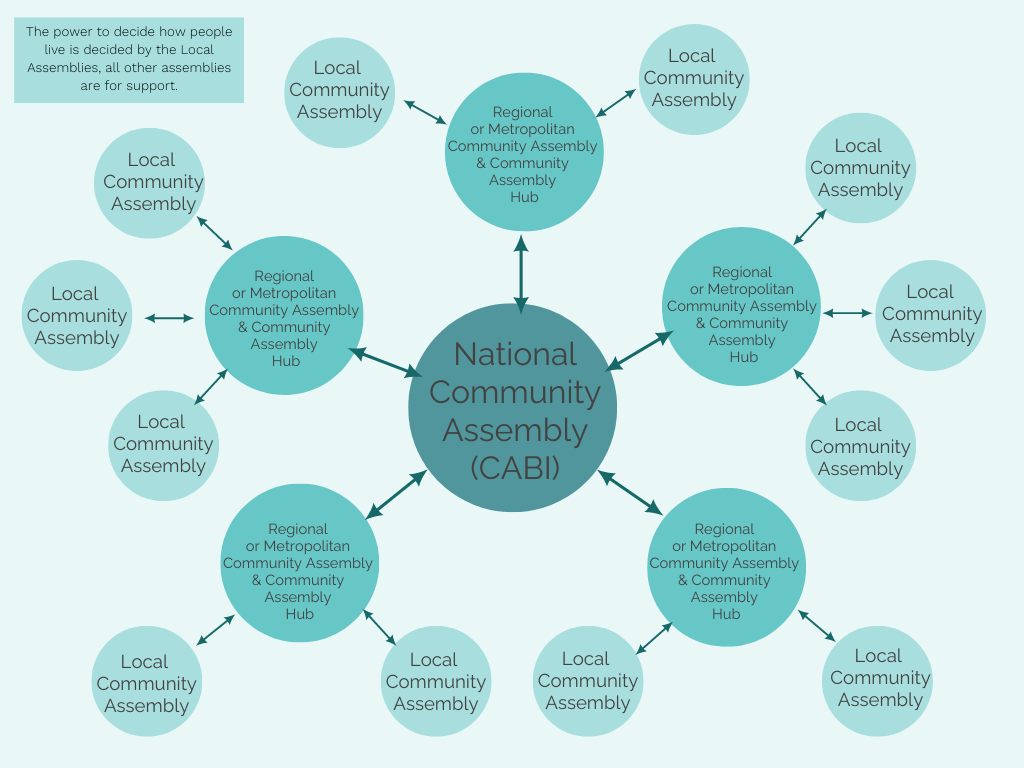Community Assembly
Framework
Our framework provides a holistic way to connect with one another so that we can share the benefits of the Creator's creations in a just and fair way, enabling a more fulfilling experience for humanity.
Sue Cartwright, Constable of the Court, Community Assembly of the British Isles
OUR PRINCIPLES
For an explanation of the current structure of the Community Assembly of the British Isles (CA British Isles) framework, we always start with the most important and these are our Members who are joined together and underpinned by our collective vision to realise a beautiful way of life on planet Earth for all people according to Natural Law whereby:
- The potential of every individual is opimised to pursue their conscience which dictates right from wrong.
- Our conscience is our inter-connectedness to every other creation and is achieved initially by creating a structure which connects every Member to each other and provides the best available knowledge.
- Each individual is enabled and supported to fulfil their obligations to one another and to future generations.
- It is ensured that each Member prevents harm caused to any other Member according to Natural Law.
- The acceptance of each individual's point of view in respect of their rights has to have a 51 percent majority by each relative collective in order to be accepted as a core principle. If 51 percent of the people reject the proposed principle, then it can be restricted.
This is the method of decision-making as defined by Natural Law whereby 51 percent is the majority average. Each decision needs to be thought through carefully so that if, for example, 51 percent of a community decide that flip-flops should be worn all year round, what happens to the 49 percent who have poor circulation in their feet? To force the 49 percent to follow the new rule has a potential to cause harm and so it is not enforceable. The 51 percent rule can only apply where there is no known chance of harm. - The decision-making principle is also used to settle disputes between Members. This is where rationality is determined by evidence that supports the best understanding as to what is true at any point in time in order for society to be able to impose its will upon any individual. This ensures that the
best available knowledge
is being applied by every individual to minimise harm to others.
- The rules of interaction and dispute resolution must be ratified at all times by at least 51 percent of the Members or group of Members in a particular area, and only relates to the duties, rights and obligations within the span of the 51 percent majority.
- Society has no obligation to any individual beyond upholding the
rule of
Natural Law.
The best application of the Creator's resources under our collective lawful control is that we must do all within our power to ensure that each individual has the resources to provide for themselves:
- Shelter from the environment
- Ability to grow organic food
- Access to clean transportable water
- Access to clean fresh air
- Access to natural health care and support
- Access to knowledge and holistic education
- Security and safety
- Care and wellbeing
10. The law is simple -
an individual must provide remedy for any harm they knowingly cause. If the harm is caused because the individual has deliberately and consciously chosen to ignore humanity's best available remedy then it can be considered that they are no longer a part of that society.
The only remedy society can impose upon such an individual is to exclude them from the community, making sure they have somewhere to go or have land allocated for their shelter, food, clean water and air, as a minimum. The point is that in such cases an individual is in breach of their bond with others which they consented to when joining the community in the first place.
Last updated on 21 November 2025.
OUR FUNCTION
Flow of Information (KNOWLEDGE)
Community Assembly Facilitators provide a direct link to and from the people through our communication network.
Facilitators are an integral part of the whole who maintain a continuous flow of knowledge, information, enquiries and community news to and from Members of the Community Assembly of the British Isles (CA British Isles) and Assemblies of the World (AOW).
Structure and Function (PURPOSE)
To form a local Community Assembly requires three or more Members to step forward as volunteer Faciliators who accept responsibility for relaying information across the British Isles and the rest of the world. This creates knowledge-flow based on a two-way flow of information.
To form a country assembly requires one Emissary and a minimum of three Facilitators.
Facilitators are required to work as a team on behalf of Members in the community. As these roles are voluntary, it is important to ensure that when someone wants to move on, they find someone to replace them so that their duties are taken over by a new Facilitator willing to take their place on the team.
Member Services and Framework (DELIVERY)
We have developed a range of essential services that will represent an infrastructure for our parallel society whereby our needs are met through our own undertaking and in cooperation with each other and external suppliers.
Community Assembly Meetings
All Members are encouraged to attend local and regional meetings as much as possible. Dates and locations for Regional Meetings taking place can be found on our events page. Facilitators are encouraged to organise local and regional meetings in their area.
Members, Facilitators and Emissaries meet up at various locations depending on what best suits everyone at any point in time. This allows new Members and their guests to learn about CA British Isles, find out the latest news that is not shared publically, have any questions answers and receive support in setting up their own assemblies.
Kernow Assembly & Kort Ownder
With over 300 Members in Cornwall (May 2025), the Kernow Assembly was established (March 2024) in the same vein as the Stannary Parliament system so that customs that worked for the people in history are maintained. As Cornwall has its own Community Peace Service and Community Peace Constable trained in judicial law, the Kernow Assembly was able to set up its own Kort Ownder, 'Kort' being the Cornish word for 'court' and 'Ownder' being the Cornish word for 'fairness'.
Community Peace Service
The Community Peace Service is a voluntary group of trained Community Peace Keepers and Community Peace Constables who work in their communities and across the British isles specifically for Members. Following indepth training in arbitration and communicating with the public and external agents, a warranted ID card is issued together with a high quality uniform, beret, badge and pearl buttons representing 'pearls of wisdom' which are sown onto the epaulettes and collars of the uniform.
Community Health Initiative
The Community Health Initiative (CHI) was founded to create a network of accredited and recommended natural healing practitioners, suppliers and services for Members across the British Isles. This inspirational and cooperative initiative brings together the knowledge, expertise and remedies needed for us to protect our health and maintain a fulfilling lifestyle in harmony with Nature.
Community Health Emergency Health Fund
Our Community Health Emergency Fund is for Members who need support to pay for treatments and/or remedies. Funds are provided mainly through the generosity of donations.
Community Assembly Hub
Community Assembly Hubs will be set up by Community Assemblies when they get to the stage when they can secure physical property and land designed to provide support and services to local Members and other Community Assemblies in the area or region.
These will be central locations with premises, facilities and land from which Members can benefit. Community Assembly Hubs will be recognised as caring, learning and motivating environments dedicated to peace keeping, natural health and healing, spiritual practice, home schooling and project-based learning.
Aurora Network
Our
Aurora Network is an expanding group of high frequency individuals. Through good intentions, they are helping to clear away negative energies, raise awareness, expand our network and increase our collective consciousness.
Community Assembly Framework (ADMINISTRATION)
Our Community Assembly Framework provides a starting point which we are working on together and developing over time. All our overheads and administration costs are provided by volunteer Members with some specific costs paid for by donations.
Relevant knowlege, information and news are passed between CA British Isles Members,
AOW and the
Aurora Network. This ensures our knowledge-flow is worldwide and univeral. It is a source of inspiration and support for everyone.
Freedom of Choice and Disputes
Our Community Assembly Framework provides a structure which allows for freedom of choice. This is when we agree to abide by Natural Law and take responsibility for ourselves and our actions. Our central team of volunteers provides administrative support and neutrality thereby bridging the gap between individual freedoms, liberties, natural rights and the needs of our Members.
Secondary to this is the process of dispute resolution, if and when disputes occur.
The reason for this being the responsibility of CA British Isles is that some disputes could be territorial and CABI will be responsible for distribution and acceptance of information to and from the rest of the world (see below).
Last updated on 21 November 2025.
OUR PURPOSE
Overriding Premise
Within our consented behaviour under the rule of Natural Law, we are free to choose how we want to interact and how we want to live together in peace and harmony. Each Member has consented to the respective duties, rights and obligations of the larger membership as ratified by the 51 percent majority vote of any given group or area.
The main role of the central volunteer team at CABI is to implement structures and maintain administrative processes that are designed to ensure accountability, transparency, rationality, responsiveness, the rule of Natural Law, stability, fairness, inclusiveness, empowerment and broad-based participation on behalf of our Members.
Local Levels
Small towns, villages and hamlets
Community Assembly of [name of town/village/hamlet]
3 or more Facilitators (Members of CA British Isles)
Group Directory - Main page listing & Community Assembly profile
Trade Directory - Members of CA British Isles
Area Levels
Named locations and areas spanning one or more boudaries
Community Assembly of [name of area]
3 or more Facilitators (Members of CA British Isles)
Group Directory - Main page listing & Community Assembly profile
Trade Directory - Members of CA British Isles
Metropolitan Levels
Cities and Inner Cities
Community Assembly of [name of city]
3 or more Faciitators (Members of CA British Isles)
Group Directory - Main page listing & Community Assembly profile
Trade Directory - Members of CA British Isles
Regional Assemblies
Named County, Island or Inner Country (eg, Yorkshire, Cornwall)
Community Assembly of [name of country/island/inner country]
3 or more Facilitators (Members of CA British Isles)
Group Directory - Main page listing & Community Assembly profile
Trade Directory - Members of CA British Isles
British Isles Assembly
ADMINISTRATION, COMMUNICATION & SERVICES
Community Assembly of the British Isles (CA British Isles)
1 x Emissary (Member of CA British Isles)
Territory of Indigenous Peoples (Eg, Territory of Kernow)
ADMINISTRATION, COMMUNICATION & SERVICES
1 x Emissary (Member of CA British Isles) - per region
Assemblies of the World
ADMINISTRATION, COMMUNICATION & SERVICES
Assemblies of the World (AOW)
1 x Emissary (Member of CA British Isles)
Last updated on 21 November 2025.
If you want to go quickly, go alone. If you want to go far, go together.


